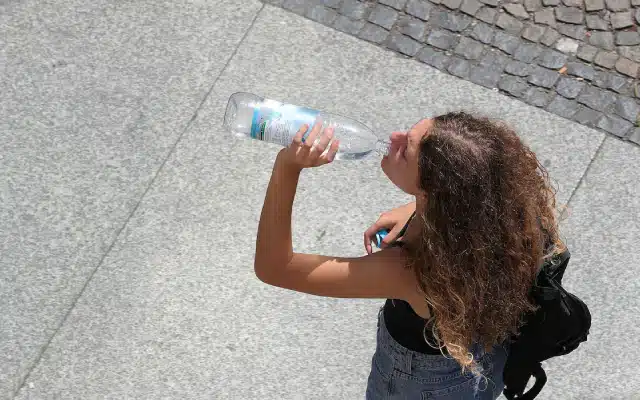A recent study found that the average one-liter (33-ounce) bottle of water contains about 240,000 plastic fragments. The researchers concluded that a significant portion of those fragments have previously gone unreported, indicating that health risks associated with plastic pollution may be greatly overstated.
The peer-reviewed study, published Monday in the journal Proceedings of the National Academy of Sciences, is the first to evaluate bottled water for the presence of “nanoplastics” – plastic particles under 1 micrometer in length, or one-seventieth the width of a human hair. The findings show that bottled water could contain up to 100 times more plastic particles than previously estimated, as earlier studies only accounted for microplastics, or pieces between 1 and 5,000 micrometers.
Nanoplastics pose a greater threat to human health than microplastics because they’re small enough to penetrate human cells, enter the bloodstream and impact organs. Nanoplastics can also pass through the placenta to the bodies of unborn babies. Scientists have long suspected their presence in bottled water, but lacked the technology to identify individual nanoparticles.
To get around that problem, the co-authors of the study developed a novel method of microscopy, programmed an algorithm based on data, and applied all of that to examine about twenty-five one-liter water bottles that were bought from three well-known US brands. (The researchers did not want to name the brands.) Ninety percent of the 110,000–370,000 microscopic plastic particles they discovered in each liter were nanoplastics.
“This study provides a powerful tool to address the challenges in analyzing nanoplastics, which holds the promise to bridge the current knowledge gap on plastic pollution at the nano level,” says Naixin Qian, the study’s lead author and a graduate student of Columbia University in chemistry.
“Previously this was just a dark area, uncharted. Toxicity studies were just guessing what’s in there,” adds Beizhan Yan, the study’s co-author and an environmental chemist at Columbia University. “This opens a window where we can look into a world that was not exposed to us before.”
The researchers targeted seven common plastic types, including polyethylene terephthalate (PET), which many water bottles are made from, and polyamide, often used in filters to purify water before it’s bottled. But they also discovered many unidentified nanoparticles in the water. If any of those are also nanoplastics, the prevalence of plastic in bottled water could be even higher.
Over 450 million tons of plastic are produced worldwide annually, most of which is disposed of in landfills. Most plastics eventually break down into smaller pieces rather than decomposing naturally. Additionally, while plastic-containing products—many synthetic fabrics included—are being used, tiny pieces of plastic are frequently lost.
Although plastic pollution is a global problem, scientists are particularly interested in bottled water due to its potential to introduce plastic particles into human bodies. According to a 2022 study, tap water has a lower concentration of microplastics than bottled water. A 2021 study issued a warning, stating that merely opening and closing a plastic water bottle’s cap can release minute pieces of plastic.
The co-authors of the latest study say their research won’t stop at bottled water. They also plan to investigate nanoplastics in tap water and snow samples collected from western Antarctica. “There is a huge world of nanoplastics to be studied,” said Wei Min, another co-author and a biophysicist at Columbia University. “The smaller things are, the more easily they can get inside us.”
Read More




